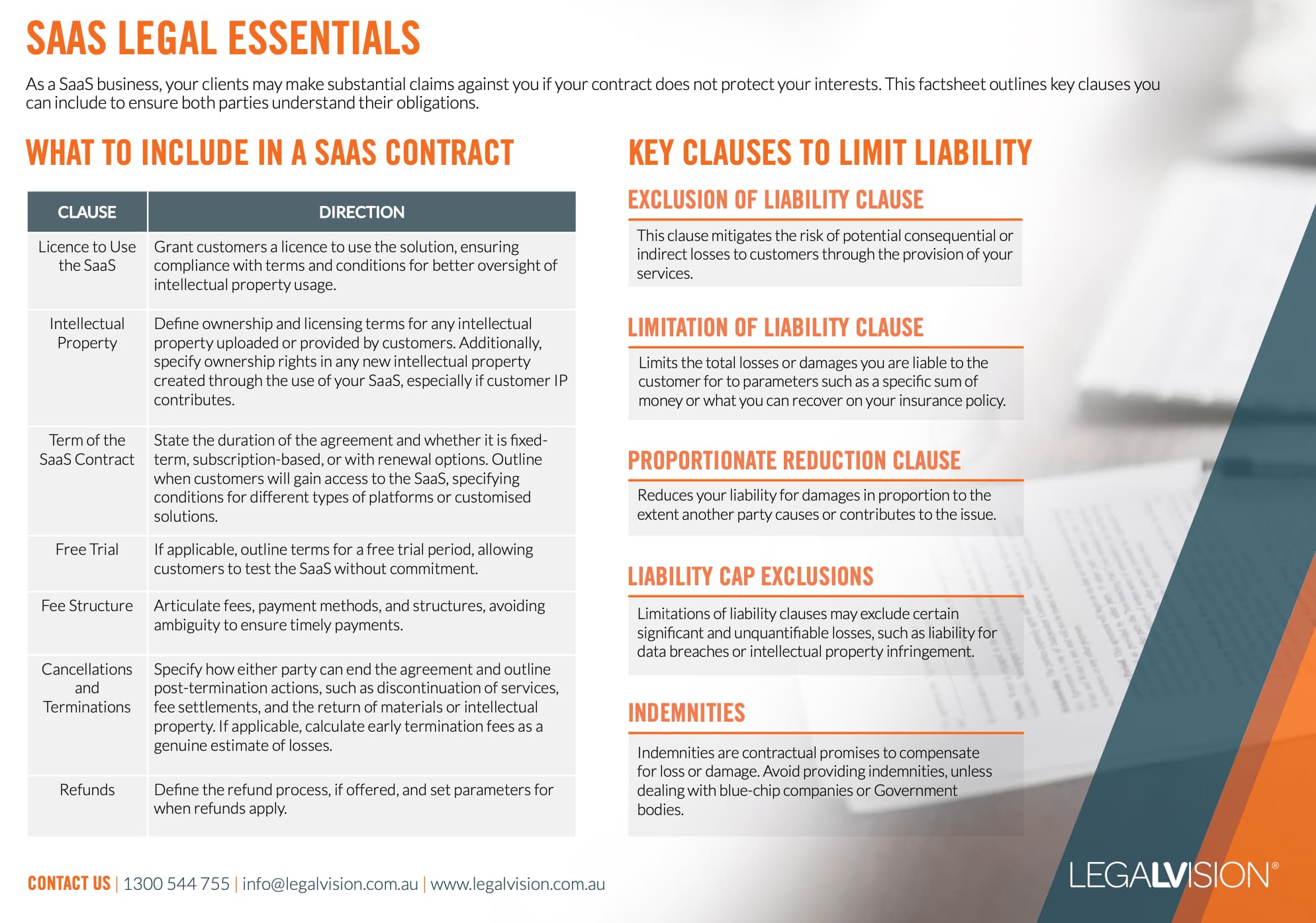In Short
- Negotiate IT contracts that suit your NFP’s operational needs, including clear SLAs, data protection, and regulatory compliance.
- Include cost controls, flexible payment terms, and explicit termination rights to protect your budget and operations.
- Retain ownership of your data, customisations, and intellectual property while planning for smooth transitions if the contract ends.
Tips for Businesses
Review every IT contract carefully to ensure it matches your NFP’s mission and constraints. Prioritise performance standards, data security, and regulatory compliance. Ask for NFP discounts, define clear cost controls, and secure termination rights to retain control over your data and avoid unexpected costs.
Not-for-profit organisations (NFPs) increasingly rely on technology to deliver services, manage operations, and engage with stakeholders. Understanding how to navigate these agreements effectively protects your organisation from costly disputes while ensuring you receive appropriate technology solutions. This article outlines key considerations for NFPs when entering IT contracts and explains how to negotiate terms that align with your organisation’s mission and constraints.
Key Contract Terms to Negotiate
Service Level Agreements (SLAs)
You should insist on clear performance standards that reflect your operational needs. This includes defining acceptable downtime limits, response times for support requests, and resolution timeframes for different issue categories.
In addition, take into account seasonal variations in your operations. For example, if you process higher donation volumes during specific periods, negotiate enhanced SLA requirements for these critical times. This ensures that your contract recognises that technology failures during peak fundraising periods can cause disproportionate harm to your mission.
Data Protection and Security
Your organisation handles sensitive donor information, client data, and confidential program details. Therefore, it is essential to ensure that vendors implement appropriate security measures and comply with privacy legislation. Rather than accepting generic security clauses, you should negotiate specific data handling requirements that reflect your operational risks.
In addition, require vendors to provide regular security reports, undergo independent audits, and notify you immediately of any breaches. Finally, your contract should clearly define data ownership and outline procedures for the return or destruction of data upon termination of the relationship.
Intellectual Property Considerations
Many IT contracts contain broad intellectual property clauses that could affect your organisation’s content, processes, or innovations. You should retain ownership of your data, customisations specific to your operations, and any intellectual property you contribute to the project.
Regulatory Compliance Considerations
NFPs operate within a complex multi-jurisdictional regulatory framework that significantly impacts IT contracting. You must navigate both federal requirements under the Australian Charities and Not-for-Profits Commission (ACNC) and varying state-based regulations that govern your operations and fundraising activities.
Your IT contracts should explicitly address compliance obligations. To begin with, require vendors to demonstrate an understanding of the charitable sector’s regulatory environment and ensure their systems can meet your reporting requirements. This may include:
- maintaining audit trails for financial transactions;
- preserving donor privacy in line with fundraising regulations; and
- supporting your ACNC compliance obligations.
Furthermore, consider including clauses that require vendors to update their systems in response to changes in regulatory requirements. As the charitable sector faces ongoing reform, your technology infrastructure must be able to adapt. For this reason, your contract should allocate responsibility for compliance-related system modifications and outline clear procedures for implementing regulatory changes without disrupting services.
Authority and Permission Framework
Your IT contracts must clearly establish vendor authority limitations and permission requirements, particularly when systems handle sensitive charitable data or interact with external parties. Unlike commercial entities, NFPs often require explicit permissions for various activities, and your vendors must respect these constraints.
Your contracts should include provisions requiring vendors to obtain explicit permission before accessing, processing, or sharing your organisation’s data with third parties. This is particularly important where IT systems integrate with:
- fundraising platforms;
- payment processors; or
- data analytics services.
In addition, the contract should make clear that vendors are prohibited from using your charitable status, donor information, or beneficiary data for any purpose beyond the agreed service delivery.
Budget Protection Strategies
Payment Terms and Structures
You need payment terms that align with your funding cycles and cash flow patterns. Wherever possible, negotiate monthly payments rather than large upfront fees, and seek flexibility around payment timing when grant funding is received quarterly or annually.
In addition, consider requesting volume discounts based on your NFP status. Many vendors provide charitable organisation pricing, but you will need to ask for these concessions directly. To avoid future disputes, make sure that any discount agreements are clearly documented in your contract.
Cost Control Mechanisms
Your contract should include:
- caps on additional charges;
- change request fees; and
- support costs beyond basic SLA coverage.
It is also important to clearly define what constitutes included services versus chargeable extras. In addition, negotiate approval processes for any work that exceeds the agreed budget so that you retain control over spending and avoid unexpected costs.
Limitation of Liability Clauses
Vendors often try to limit their liability to the contract value or exclude consequential damages altogether. You should push for more balanced terms that recognise the real impact IT failures can have on your operations and beneficiaries.
One option is to negotiate mutual liability caps rather than accepting one-sided vendor protections. Also, make sure that any liability limitations include carve-outs for gross negligence, wilful misconduct, or data breaches, as these incidents could cause serious harm to your organisation’s reputation and operations.
Continue reading this article below the formTermination and Exit Planning
Termination Rights
Negotiate broad termination rights that allow you to exit the contract if the vendor fails to meet performance standards or if your funding situation changes. You should also include termination-for-convenience clauses with reasonable notice periods.
Additionally, the contract should address what happens to your data, customisations, and ongoing support needs when the relationship ends. Planning for smooth transitions to new providers will help prevent service disruptions and protect your operations.

As a SaaS business, your clients may make substantial claims against you if your contract does not protect your interests. This factsheet outlines key clauses you can include to ensure both parties understand their obligations.
Key Takeaways
NFP organisations need IT contracts that reflect their unique constraints and requirements. Prioritise negotiating appropriate SLAs, robust data protection measures, and cost controls that align with your operational needs and budget. It is also essential to plan for contract termination and ensure you retain control over your data and intellectual property. Finally, remember that vendors often provide NFP discounts, but these concessions must be requested explicitly during negotiations.
If you need help navigating IT contracts, our experienced IT lawyers can assist as part of our LegalVision membership. For a low monthly fee, you will have unlimited access to lawyers to answer your questions and draft and review your documents. Call us today on 1300 544 755 or visit our membership page.
Frequently Asked Questions
Yes, many vendors offer special pricing and terms for charitable organisations. However, you must specifically request these concessions and demonstrate your NFP status with appropriate documentation.
Include termination for convenience clauses with reasonable notice periods. Many vendors understand NFP funding challenges and may offer payment deferrals or contract suspensions during temporary funding gaps.
Negotiate specific data handling requirements, ensure compliance with Australian privacy laws, and require vendors to undergo regular security audits. Always retain ownership and control over beneficiary information.
We appreciate your feedback – your submission has been successfully received.












